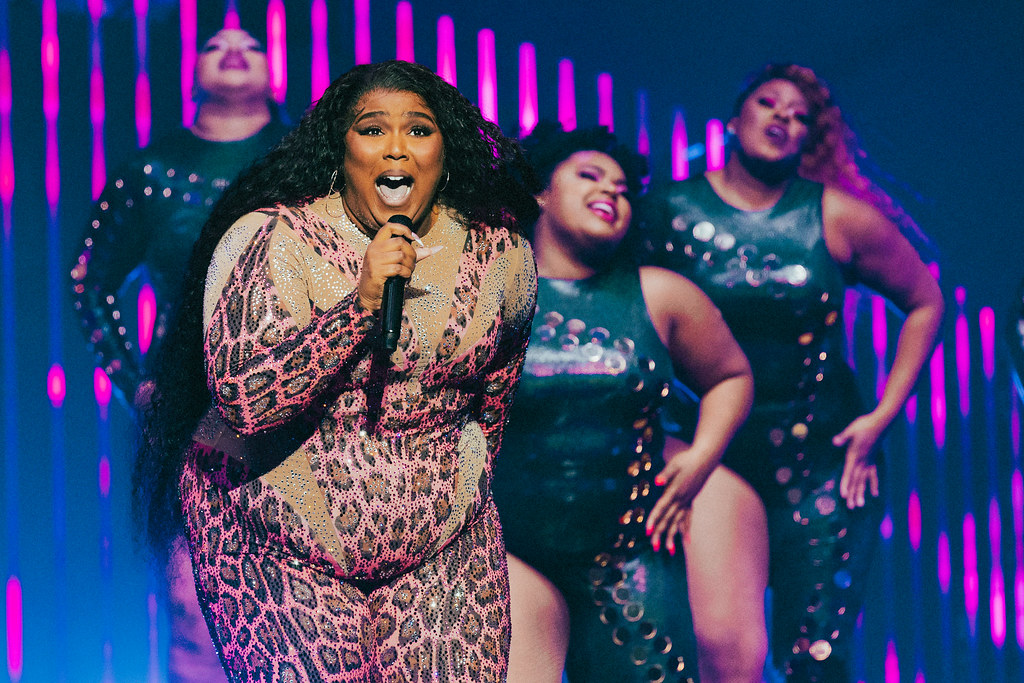Lizzo’s Uncanny Controversy

Image from Creative Commons
TRIGGER WARNING: SEXUAL ASSAULT
As one of the faces of body positivity the latest news on Lizzo shocked everyone.
Lizzo is an African-American pop singer, most recognizable by her hit songs “Truth Hurts,” “About Damn Time” and many more. Lizzo is currently on her “The Special Tour,” for her latest album of the same name. Her shows received positive reviews and profits have been high, with her earning close to $40 million during the opening month of her tour, according to Pollstar.
However, this past month Lizzo’s dance captain, Shirlene Quigley, her production company “Big Grrrl Big Touring” and Lizzo herself have been faced with accusations of discrimination, false imprisonment, sexual assault and harassment, as well as religious and racial harassment. The lawsuit was filed by three of Lizzo’s dancers, Arianna Davis, Crystal Williams and Noelle Rodriguez, according to Pollstar.
In the lawsuit, dancers claimed they were abused and subjected to problematic activities. The claims, as reported by Lifestyle Asia, include forcing one of the dancers to touch a nude performer at a nightclub in Amsterdam, falsely accusing dancer(s) of drinking on the job and a passive-aggressive comment on a dancer’s weight (causing the dancer to disclose personal information in order to maintain her position on the tour).
Other accusations include unfair treatment of Black members and negative comments about their performance throughout the tour and unfair wages during the European leg of the tour, in which the dancers claimed that they were missing 25 percent of their weekly earnings.
The aftermath of the lawsuit and accusations that followed have caused even big names, like Beyonce, to take action. While performing “Break My Soul (Queen’s Remix)” in Boston, fans noticed that when Beyonce was naming off Black women in the industry, Lizzo’s name was nowhere to be heard unlike in the studio recording. Fans speculated that this was in response to the accusations and lawsuit filed against Lizzo. Instead, Beyonce repeated Erykah Badu’s name four times in replacement of Lizzo’s, according to CNN.
Lizzo took to social media to respond to the controversy. In an Instagram post, the artist states that the allegations against her are false and provide inaccurate reflection of who she is Lizzo also stated that the victims, as well as the media, are trying to portray her as the “villain.” Lizzo continues that while she is not the victim here, she will not allow the “good work she has done in the world to be overshadowed by this.” She concludes the post by thanking everyone who has “lifted her up” during this “difficult time.”
The accusations that have been made against Lizzo are a direct contradiction to her entire brand. The accusations have also provided a gateway of fatphobic comments, diminishing the gravity of the accusations made against her. On pages like The Shade Room, people have commented things like “fat on fat crime is crazy” and jokes that implied that Lizzo was depriving her workers of food.
When it comes to plus-sized figures in the media, the world continues to show them little to no respect to their person. On top of these remarks, jokes are also being made about the perpetrators and victims of sexual harassment, assault and other abuses. It is comments like these that stop victims, especially plus-sized victims,
from coming forward with their stories, whilst allowing alleged perpetrators like Lizzo to continue their abuse towards future victims.
Nevertheless, Lizzo’s reported actions are revolting. Contradicting your brand in such an extreme way and subjecting your dancers to abuse in an environment that you depict as safe is unbelievable. What makes matters worse is the artist’s dismissive response and playing the victim.
However, the dancers have received support from individuals who have previously worked with Lizzo. According to Republic World, one of Lizzo’s former creative directors, Quinn Whitney Wilson, has come forward in support of the dancer’s and shared similar experiences described by the dancers. Wilson states “I haven’t been a part of that world for around three years, for a reason. I very much applaud the dancers’ courage to bring this to light and I grieve parts of my own experience.”
Another source, Sophia Nahli Allison, spoke out about her experience with Lizzo. Sophia and Lizzo were set to work together back in 2019 on a documentary about the artist, but Sophia left two weeks into the project, as she felt that the work environment was hostile and toxic. According to Lifestyle Asia, after the dancers filed their lawsuit, that same day, Sophia took to Instagram and posted the following “Lizzo creates an extremely toxic and hostile work environment and undermines the work, labor and authority of other black and brown women in the process. (Notice how the documentary ended up being directed by a cis white man.)” She proceeds to call Lizzo a narcissistic bully and claims that her image is a façade, further supporting the dancer’s claims.
As a plus-sized individual myself and someone who loved Lizzo’s advocacy and presence in the media, this news was disheartening and I expected more from her. Lizzo has made her brand to be a representative of plus-sized people. Her carefree and confident image that made ignorant, chauvinistic people sick has been eradicated by harassing and abusing the same women who you were supposed to support. Lizzo, I hope for your sake that the rumors are NOT true.
- Categories: